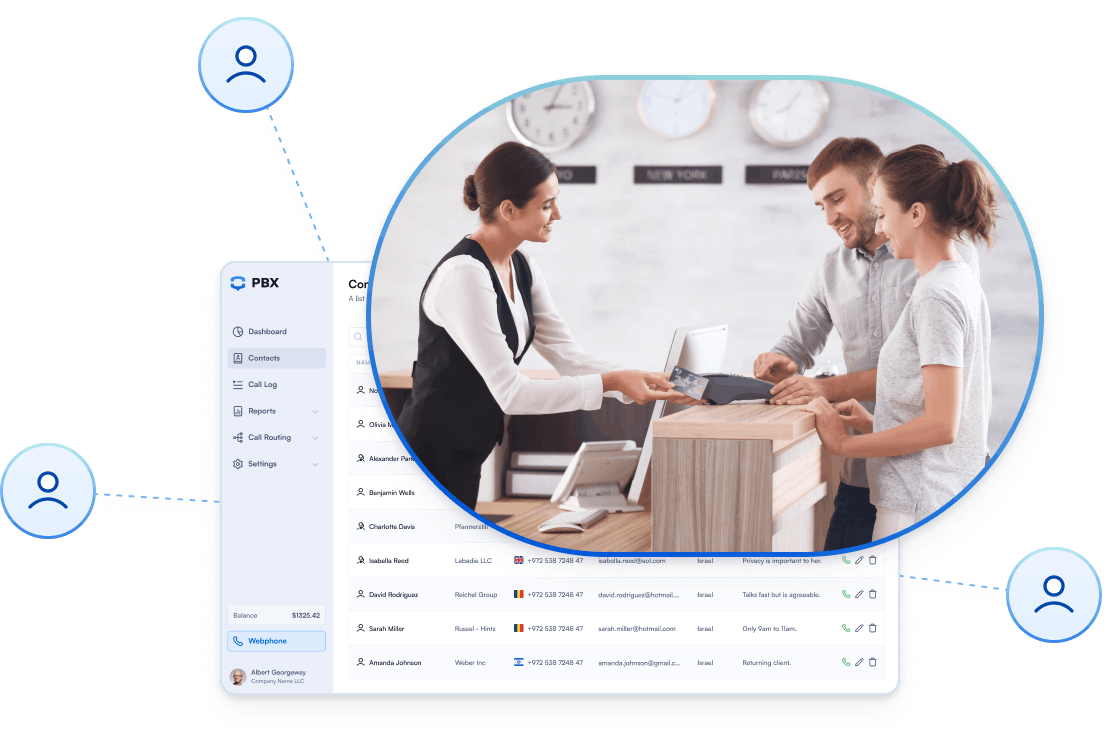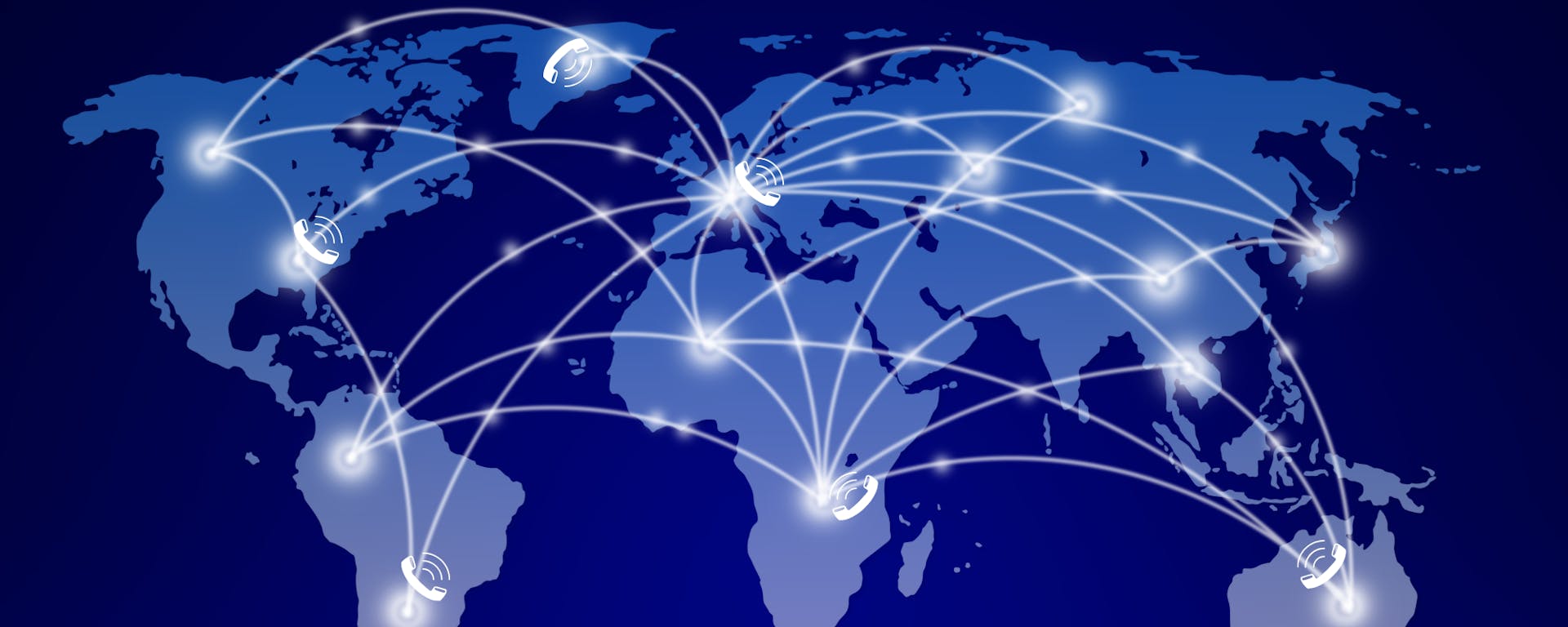
As tourism businesses like hotels or travel agencies gear up for peak seasons, handling an influx of customer inquiries and bookings becomes a challenge. During these high-demand periods, having efficient communication tools is essential to ensure customer satisfaction and operational success. This article discusses how hotel PBX and VoIP (Voice over Internet Protocol) solutions help travel and tourism companies manage busy times with ease and efficiency.
Key Takeaways:
PBX and VoIP software in the tourism industry is an external and internal solution which allows phone communication with customers and employees. The available features enable a more streamlined communication, even in high traffic seasons and holidays. If you're running a travel agency, hotel or any customer-facing travel business, VoIP can be a game-changer.
There are 4 main benefits of using VoIP:
High-demand seasons may cause problems with call and booking volume. See how you can prevent it:
During peak travel seasons, call volumes can skyrocket. Without the right tools, businesses risk losing customers due to long wait times or missed calls. VoIP systems come equipped with call queuing features that allow businesses to manage high call volumes by placing incoming calls in a queue until an agent is available.
In addition to call queuing, VoIP systems improve the customer experience with options like hold music and callback features. Instead of waiting on hold indefinitely, customers can choose to receive a callback when an agent is free, reducing frustration and improving satisfaction.
Travel businesses often need to ramp up their staffing during peak seasons. VoIP systems make it easy to onboard temporary agents quickly by allowing businesses to add and remove phone lines as needed. Whether you’re hiring seasonal staff or bringing in remote workers, VoIP ensures seamless onboarding and training.
With features like call monitoring and coaching, training new agents becomes more efficient. Supervisors can listen in on calls, provide feedback in real-time, and ensure consistent service quality. Learn more about call monitoring. Additionally, VoIP's remote work capabilities allow agents to handle customer inquiries from anywhere, enabling businesses to scale up their support team without requiring everyone to be in the same physical location.
Travel businesses operate across different time zones, and VoIP systems help manage 24/7 availability with time-based routing. This feature automatically directs calls to agents in specific time zones, ensuring round-the-clock support during peak travel periods, whether for domestic or international customers. PBX.IM offers 24/7 support, ensuring your business stays responsive regardless of the time.
For businesses catering to a global audience, VoIP can also enable language-based call routing. Calls are automatically directed to agents who speak the same language as the caller, improving the customer experience and ensuring they connect with the right person right away.
As your travel business grows, scaling your customer support becomes essential. With traditional phone systems, adding new lines can be expensive and time-consuming, but VoIP offers cost-effective scalability. It allows businesses to add more phone lines without expensive infrastructure upgrades.
During peak seasons, VoIP systems can handle high-call-volume campaigns such as promotions or special holiday travel offers. Whether it’s a flash sale or an increase in bookings due to seasonal demand, VoIP scales communication effortlessly, helping you manage the surge in traffic without compromising on quality.
One of the standout features of VoIP systems is their built-in analytics tools. Travel businesses can monitor call traffic and agent performance in real time, allowing them to identify bottlenecks and adjust staffing as needed during peak seasons.
These predictive insights help businesses prepare for future high-demand periods by analyzing call trends from previous seasons. With this data, businesses can optimize their customer service strategies and ensure they're adequately staffed for upcoming travel peaks.
Integration between your phone system and booking platforms is essential. A cloud phone system can sync with your CRM or booking software, allowing customer data to flow seamlessly between systems. This ensures that every customer interaction is logged and accessible, improving both operational efficiency and customer service.
Imagine being able to instantly pull up a guest’s booking information when they call for an inquiry. No need for reservation numbers or fumbling through disconnected systems.
Given the international nature of travel and hospitality, supporting multiple languages is key. Cloud phone systems offer multilingual support, allowing you to provide better service to your global clientele. You can switch between language options in real-time, ensuring that guests feel comfortable and understood, no matter where they’re calling from.
In the travel and hospitality industry, mobility is essential. Staff often need to be on the move, whether they’re managing operations across a sprawling resort or assisting guests remotely. Cloud phone systems provide web phone applications that allow employees to handle calls on their smartphones or tablets, regardless of their location.
For example, a travel agent could assist clients while they’re travelling themselves, without being tethered to an office landline.
With any cloud-based system, security is a top priority, especially when handling sensitive customer information like credit card details or personal data. It’s essential to ensure that your VoIP provider adheres to industry security standards and compliance regulations, such as GDPR or PCI-DSS.
To protect customer information, implement best practices such as encryption, two-factor authentication, and regular system audits.
At PBX.IM, we are GDPR and ISO27001 compliant and all our accounts have 2FA options available. You can check out more about how PBX.IM ensures security and compliance.
VoIP systems rely on a stable internet connection. Poor connectivity can lead to dropped calls or diminished call quality, which is a major concern in an industry that thrives on seamless communication. To combat this, ensure that your business has a reliable internet provider and consider backup solutions, like cellular failovers, to keep operations running smoothly.
If something happens, don’t worry! At PBX.IM we have 24/7 support that you can rely on.
To better understand the impact of VoIP systems in the travel and hospitality industry, let’s look at two practical examples. These scenarios illustrate common challenges faced by businesses in this space and how VoIP can provide effective solutions.
A boutique hotel with a single location decides to open two new branches in different cities. With their current landline system, communication between the locations is difficult and costly. They rely on traditional phone lines for internal coordination and guest communication, leading to high operational expenses. Additionally, the hotel’s management team struggles with maintaining consistent customer service across all branches due to poor communication tools.
How VoIP can help: By switching to a VoIP system, the boutique hotel can centralize communication across all its branches, ensuring seamless coordination between the locations. The management can easily communicate with staff, regardless of their location, using softphone apps on mobile devices. The hotel can also reduce costs by eliminating the need for separate landline systems at each site, using a single cloud-based platform to manage all communication. Moreover, guests can call any branch, and the call can be routed to the appropriate location based on their needs.
A travel agency with clients across the globe frequently faces issues with managing high call volumes, especially during peak vacation seasons. With agents working remotely in different time zones, coordinating calls and managing customer requests efficiently becomes a challenge. Their traditional phone system struggles with handling international calls, leading to high costs and missed opportunities due to limited lines and unorganized communication.
How VoIP can help: A VoIP system can completely transform the agency’s operations. VoIP allows the agency to handle calls from any location, regardless of where the agents are based, thanks to its cloud-based nature. Agents working remotely can take calls via their laptops or smartphones, enabling them to assist clients from anywhere. VoIP’s call routing feature ensures that calls are automatically directed to the most available or appropriate agent, reducing wait times. In addition, the agency can significantly reduce costs by using VoIP for international calls and eliminating traditional long-distance charges.
At PBX.IM, we understand the unique challenges travel businesses face during peak seasons. Our VoIP solutions offer all the essential features, from 24/7 support to cost-effective scalability and advanced analytics tools. Learn how PBX.IM is providing hospitality communications solutions to help the travel industry thrive with our tailored VoIP solutions.
VoIP is proving to be an invaluable tool for travel businesses during peak seasons. It helps manage increased call volumes, supports flexible staffing, enhances global customer service, and offers scalable solutions at minimal costs. With analytics tools, travel companies can also make data-driven decisions to optimize their customer service strategies. If your travel business is looking to survive and thrive during busy seasons, now is the time to consider adopting a VoIP system.
VoIP systems manage increased call volumes with features like call queueing and callback options, helping reduce missed calls and customer wait times.
Yes, VoIP allows time-based and language-based call routing, ensuring customers are connected with the right agent, no matter the time zone or language.
Absolutely. VoIP allows businesses to add phone lines and agents without the need for expensive infrastructure upgrades, making it perfect for scaling during peak seasons. Its flexible pricing models also help businesses scale communication during peak seasons.
Key features include call routing, multilingual support, CRM integration, and mobility solutions. These help improve customer service, manage multiple locations, and streamline operations.
VoIP systems can be highly secure when businesses use encryption, two-factor authentication, and comply with industry regulations like GDPR or PCI-DSS, ensuring customer data remains protected.

... to see how your business can start saving on communication costs today in travel industry

Discover how VoIP systems can streamline communication, reduce costs, and enhance customer service for travel and hospitality businesses globally.

VoIP is helping travel agencies enhance global customer support with 24/7 availability, multilingual routing, and lower costs. Discover the benefits!